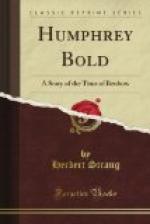It was when I was approaching the end of my seventeenth year that I began to think of the future more nearly. My father had suffered long—though Mistress Pennyquick and I had known nothing of it, he being so reticent—from a disease which nowadays physicians call angina pectoris, a disease that grips a man by the chest, as ’twere his breastbones are ground together, with breathlessness and exquisite pain. As he grew older, the attacks recurred more frequently and with greater violence, and after one of them, the first I had seen with my own eyes, he sent for Mr. Vetch, the attorney, and was closeted with him a great while in his room. Mistress Pennyquick’s face was very grave when she spoke to me about it afterwards.
“’Tis a bad sign when a man sends for his lawyer, Humphrey,” she said. “I can’t abide ’un, for they always make me think of my latter end. Your father have made his will, I’ll be bound, and I wish he spoke more free of things. But there, ’tis always the way; empty barrels make the most noise, as the saying is, and I will groan with the toothache while the poor master will suffer his agonies without a word.”
One night as we were sitting reading, my father had an attack which terrified us. All at once, without a moment’s warning, he dropped his book, and stood up, bending forward, his face blue, his eyes almost starting from his head. We hastened to him, but he motioned us away, and then Mistress Pennyquick bade me ride for Mr. Pinhorn. I snatched my cap, and, knowing that with my long legs I could reach the town by the fields more quickly than on horseback by the road, I did not stay to saddle Jerry, but set off at full speed across five-acre, vaulted the gate into the spinney, and so on till I gained the bridge, by which time I was blowing like a furnace.
It was dark, being October, and though I knew every yard of our ground, I marvel now to think how I escaped breaking my leg in a ditch or coming to some other mishap. I raced on to Raven Street, where Mr. Pinhorn lived, and by good luck found him just alighting at the door from his nag. I told him my errand in gasps; the good surgeon understood without much telling, and he leaped again into the saddle (his foot never having left the stirrup) and galloped away.
My knees shook so violently with the exertions I had made that I would fain have rested awhile before returning. But the thought that my father might die in my absence struck me with a chill, and I set off at a swinging stride after the surgeon.
I had gone but a few yards, however, when ahead of me, by the light of a flickering oil lamp, hanging from a bracket before one of the houses, I saw a group of some five or six, youths by their build, gathered about a doorway. Immediately afterwards I heard from the same spot a harsh sound as of rending wood, followed by guffaws of laughter. The party then moved quickly on for a few paces, and again came to a halt at a doorway, whence in a few seconds the same sound reached my ears.




